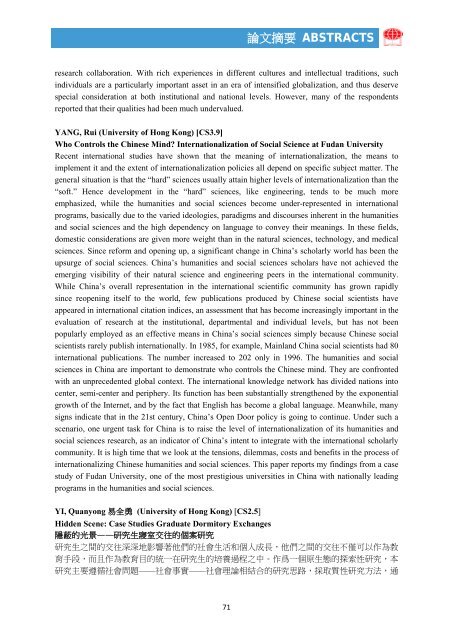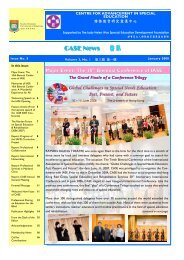ABSTRACTS - Faculty of Education - The University of Hong Kong
ABSTRACTS - Faculty of Education - The University of Hong Kong
ABSTRACTS - Faculty of Education - The University of Hong Kong
You also want an ePaper? Increase the reach of your titles
YUMPU automatically turns print PDFs into web optimized ePapers that Google loves.
71<br />
論文摘要 <strong>ABSTRACTS</strong><br />
research collaboration. With rich experiences in different cultures and intellectual traditions, such<br />
individuals are a particularly important asset in an era <strong>of</strong> intensified globalization, and thus deserve<br />
special consideration at both institutional and national levels. However, many <strong>of</strong> the respondents<br />
reported that their qualities had been much undervalued.<br />
YANG, Rui (<strong>University</strong> <strong>of</strong> <strong>Hong</strong> <strong>Kong</strong>) [CS3.9]<br />
Who Controls the Chinese Mind? Internationalization <strong>of</strong> Social Science at Fudan <strong>University</strong><br />
Recent international studies have shown that the meaning <strong>of</strong> internationalization, the means to<br />
implement it and the extent <strong>of</strong> internationalization policies all depend on specific subject matter. <strong>The</strong><br />
general situation is that the “hard” sciences usually attain higher levels <strong>of</strong> internationalization than the<br />
“s<strong>of</strong>t.” Hence development in the “hard” sciences, like engineering, tends to be much more<br />
emphasized, while the humanities and social sciences become under-represented in international<br />
programs, basically due to the varied ideologies, paradigms and discourses inherent in the humanities<br />
and social sciences and the high dependency on language to convey their meanings. In these fields,<br />
domestic considerations are given more weight than in the natural sciences, technology, and medical<br />
sciences. Since reform and opening up, a significant change in China’s scholarly world has been the<br />
upsurge <strong>of</strong> social sciences. China’s humanities and social sciences scholars have not achieved the<br />
emerging visibility <strong>of</strong> their natural science and engineering peers in the international community.<br />
While China’s overall representation in the international scientific community has grown rapidly<br />
since reopening itself to the world, few publications produced by Chinese social scientists have<br />
appeared in international citation indices, an assessment that has become increasingly important in the<br />
evaluation <strong>of</strong> research at the institutional, departmental and individual levels, but has not been<br />
popularly employed as an effective means in China’s social sciences simply because Chinese social<br />
scientists rarely publish internationally. In 1985, for example, Mainland China social scientists had 80<br />
international publications. <strong>The</strong> number increased to 202 only in 1996. <strong>The</strong> humanities and social<br />
sciences in China are important to demonstrate who controls the Chinese mind. <strong>The</strong>y are confronted<br />
with an unprecedented global context. <strong>The</strong> international knowledge network has divided nations into<br />
center, semi-center and periphery. Its function has been substantially strengthened by the exponential<br />
growth <strong>of</strong> the Internet, and by the fact that English has become a global language. Meanwhile, many<br />
signs indicate that in the 21st century, China’s Open Door policy is going to continue. Under such a<br />
scenario, one urgent task for China is to raise the level <strong>of</strong> internationalization <strong>of</strong> its humanities and<br />
social sciences research, as an indicator <strong>of</strong> China’s intent to integrate with the international scholarly<br />
community. It is high time that we look at the tensions, dilemmas, costs and benefits in the process <strong>of</strong><br />
internationalizing Chinese humanities and social sciences. This paper reports my findings from a case<br />
study <strong>of</strong> Fudan <strong>University</strong>, one <strong>of</strong> the most prestigious universities in China with nationally leading<br />
programs in the humanities and social sciences.<br />
YI, Quanyong 易全勇 (<strong>University</strong> <strong>of</strong> <strong>Hong</strong> <strong>Kong</strong>) [CS2.5]<br />
Hidden Scene: Case Studies Graduate Dormitory Exchanges<br />
隱蔽的光景——研究生寢室交往的個案研究<br />
研究生之間的交往深深地影響著他們的社會生活和個人成長,他們之間的交往不僅可以作為教<br />
育手段,而且作為教育目的統一在研究生的培養過程之中。作爲一個原生態的探索性研究,本<br />
研究主要遵循社會問題——社會事實——社會理論相結合的研究思路,採取質性研究方法,通
















